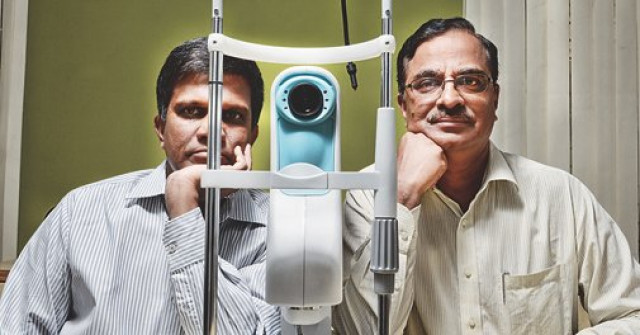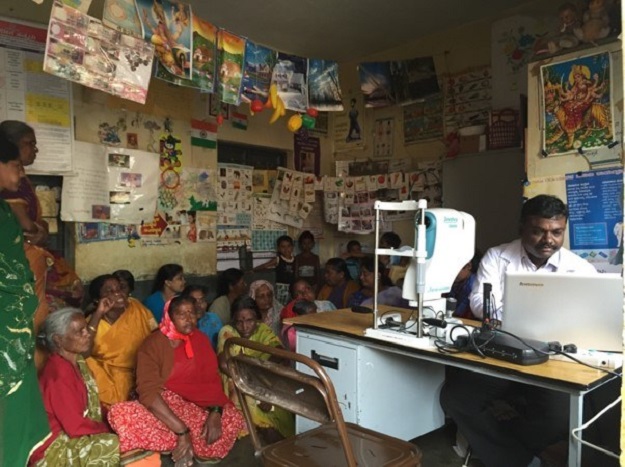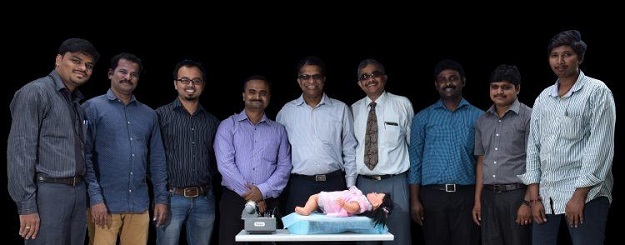80% of the world’s blindness is preventable. This hardware is fighting it in 26 countries
The healthtech startup’s products are available in 26 countries

The healthtech startup’s products are available in 26 countries. PHOTO: FORUS HEALTH
Blindness takes a toll on families too, he explains. The affected individual’s responsibilities may include earning for the household, taking care of elderly parents, and looking after children.
This Pakistani startup is helping increase worker incomes by 400%
KC, an IIM-Calcutta alum, says the number of eye doctors in India now is closer to 20,000, but they still can’t cater to everyone who needs eye care. That’s where he thinks technology can help, especially when a majority of blindness cases in the country – 75 percent, or over 11 million in 2007 – are preventable if causes like cataracts or glaucoma are caught early.
A Solution
In 2009, KC and Shyam Vasudev began work on healthtech hardware startup Forus Health. The Bangalore-based company has four products that range from US$4,000 to US$50,000. The 3Nethra classic is a small, portable digital imaging device. It’ll take, store, and transmit pictures of the front and back of the human eye that help carry out a routine eye exam. It can detect problems like cataracts, glaucoma, diabetic retinas, problems with the cornea, and refractive errors – all contributors to blindness that can be treated if caught early. Unlike other eye exams, the 3Nethra classic does not require pupil dilatation.
 PHOTO: FORUS HEALTH
PHOTO: FORUS HEALTHThe 3Nethra Flora is a non-contact eye scanner that works with pupil dilation. It takes more in-depth pictures, including the layout of blood and lymph vessels in the eye.
Detection of eye issues in children, especially younger children who can’t always communicate whether a lens prescription is correct, can be difficult. For younger or non-cooperative patients, Forus Health has the 3Nethra Kiddo, which helps detect refractive errors in eye patients. Refractive errors like nearsightedness or farsightedness occur when the eye is misshapen, causing light to bend differently around the eye. The 3Nethra Neo takes pictures of infant retinas to help diagnose and monitor diseases and disorders.
Forus Health’s devices have been installed in nearly 1,400 places in 26 countries, including the US and countries in Europe and Asia. In April 2012, the startup raised US$5 million in series A funding from Accel Partners and IDG Ventures. Two years later, it bagged US$8.2 million in series B funding from Asian Health Fund, Accel Partners, and IDG Ventures.
Tackling Prevention
KC and his team – now 125 people – faced several of the problems other medical hardware makers come across. The product needs to be effective and cost-efficient enough to convince doctors, but also must appeal to the average patient, who doesn’t have enough time to take off work unless there’s something already wrong. Convincing those patients of the value-add of preventative care like eye screenings can be difficult..
 PHOTO: FORUS HEALTH
PHOTO: FORUS HEALTH“The hardest thing is actually making people have a behavioral change,” he tells Tech in Asia.
This Pakistani startup is revolutionising the way people travel
The argument for preventative care is simple – spend a little time and money examining and monitoring your health now, and you’re likely to catch problems early. Treatment for problems caught early will cost much less. That’s why Forus Health’s flagship product – the 3Nethra Classic – doesn’t require pupil dilation. The test can be done in five minutes, and the person can go straight back to work instead of waiting hours for his or her pupils to return to normal size.
It also needs to be user-friendly – a lot of medical equipment is bulky and made for use in a hospital, but for the technology to work outside of cities, it has to be small, portable, and cost-efficient.
It took the company around 18 months to develop its first products; it would be three years before the team reached a satisfactory model.
Other startups working with low-cost healthcare hardware include Stasis Labs, Medaino, andTen3T.
Now, the startup’s focus is on expansion into other countries, something that KC mentions has always been their goal: if preventable blindness is a worldwide problem, the same goes for the company’s focus.
This article originally appeared on Tech in Asia.



















COMMENTS
Comments are moderated and generally will be posted if they are on-topic and not abusive.
For more information, please see our Comments FAQ